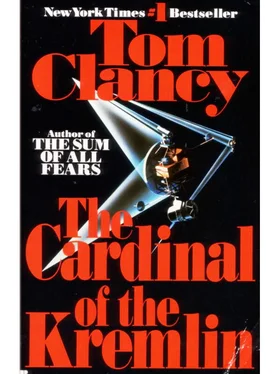Tom Clancy - The Cardinal of the Kremlin
Здесь есть возможность читать онлайн «Tom Clancy - The Cardinal of the Kremlin» весь текст электронной книги совершенно бесплатно (целиком полную версию без сокращений). В некоторых случаях можно слушать аудио, скачать через торрент в формате fb2 и присутствует краткое содержание. Год выпуска: 1988, Жанр: Триллер, на английском языке. Описание произведения, (предисловие) а так же отзывы посетителей доступны на портале библиотеки ЛибКат.
- Название:The Cardinal of the Kremlin
- Автор:
- Жанр:
- Год:1988
- ISBN:нет данных
- Рейтинг книги:3 / 5. Голосов: 1
-
Избранное:Добавить в избранное
- Отзывы:
-
Ваша оценка:
- 60
- 1
- 2
- 3
- 4
- 5
The Cardinal of the Kremlin: краткое содержание, описание и аннотация
Предлагаем к чтению аннотацию, описание, краткое содержание или предисловие (зависит от того, что написал сам автор книги «The Cardinal of the Kremlin»). Если вы не нашли необходимую информацию о книге — напишите в комментариях, мы постараемся отыскать её.
The Cardinal of the Kremlin — читать онлайн бесплатно полную книгу (весь текст) целиком
Ниже представлен текст книги, разбитый по страницам. Система сохранения места последней прочитанной страницы, позволяет с удобством читать онлайн бесплатно книгу «The Cardinal of the Kremlin», без необходимости каждый раз заново искать на чём Вы остановились. Поставьте закладку, и сможете в любой момент перейти на страницу, на которой закончили чтение.
Интервал:
Закладка:
The next morning she made her drop, and the photographs traveled across the border into Mexico on a tractor-trailer rig belonging to a long-haul concern based in Austin. It was delivering oil-drilling machinery. By the end of the day the photos would be in the Soviet Embassy in Mexico City. The day after that, in Cuba, where they would be placed on an Aeroflot flight direct to Moscow.
CHAPTER 7
Catalysts
“So, Colonel, what is your assessment?" Filitov asked.
"Comrade, Bright Star may be the most important program in the Soviet Union," Bondarenko said with conviction. He handed over forty handwritten pages. "Here is the first draft of my report. I did that on the airplane. I'll have a proper copy typed today, but I thought that you'd–"
"You thought correctly. I understand that they ran a test…"
"Thirty-six hours ago. I saw the test, and I was allowed to inspect much of the equipment both before and after. I was profoundly impressed with the installation and the people who run it. If I may be permitted, General Pokryshkin is an outstanding officer, and the perfect man for that post. He is decidedly not a careerist, but rather a progressive officer of the finest type. To manage the academics on that hilltop is no easy task–"
Misha grunted agreement. "I know about academicians. Are you telling me he has them organized like a military unit?"
"No, Comrade Colonel, but Pokryshkin has learned how to keep them relatively happy and productive at the same time. There is a sense of… a sense of mission at Bright Star that one rarely encounters even in the officer corps. I do not say this lightly, Mikhail Semyonovich. I was most impressed by all aspects of the operation. Perhaps it is the same at the space facilities. I have heard such, but having never been there, I cannot draw the comparison."
"And the systems themselves?"
"Bright Star is not yet a weapon. There are still technical difficulties. Pokryshkin identified and explained them at length to me. For the moment, this is still nothing more than an experimental program, but the most important breakthroughs have been made. In several years, it will be a weapon of enormous potential."
"What of its cost?" Misha asked. That drew a shrug.
"Impossible to estimate. It will be costly, but the expensive part of the program, the research and development phase, is largely completed. The actual production and engineering costs should be less than one might expect – for the weapon itself, that is. I cannot evaluate the costs of the support equipment, the radars, and surveillance satellites. That was not part of my brief in any case." Besides, like soldiers all over the world, he thought in terms of mission, not cost.
"And the system reliability?"
"That will be a problem, but a manageable one. The individual lasers are complex and difficult to maintain. On the other hand, by building more than the site actually needs, we could easily cycle them through a regular maintenance program, and always have the necessary number on-line. In fact, this is the method proposed by the chief project engineer."
"So they've solved the power-output problem, then?"
"My draft report describes that in rough terms. My final paper will be more specific."
Misha allowed himself a smile. "So that even I can understand it?"
"Comrade Colonel," Bondarenko replied seriously, "I know that you have a better understanding of technical matters than you care to admit. The important aspects of the power breakthrough are actually quite simple – in theory, that is. The precise engineering details are rather complex, but can easily be deduced from the redesign of the lasing cavity. As with the first atomic bomb, once the theory is described, the engineering can be worked out."
"Excellent. You can finish your report by tomorrow?"
"Yes, Comrade Colonel."
Misha stood. Bondarenko did the same. "I will read over your preliminary report this afternoon. Get me the complete report tomorrow and I will digest it over the weekend. Next week we will brief the Minister."
Allah's ways were surely mysterious, the Archer thought. As much as he'd wanted to kill a Soviet transport aircraft, all he had to do was return to his home, the river town of Ghazni. It had been only a week since he'd left Pakistan. A local storm had grounded Russian aircraft for the past several days, allowing him to make good time. He arrived with his fresh supplies of missiles and found his chieftain planning an attack on the town's outlying airport. The winter weather was hard on everyone, and the infidels left the outer security posts to Afghan soldiers in the service of the traitorous government in Kabul. What they did not know, however, was that the Major commanding the battalion on perimeter duty worked for the local mudjaheddin . The perimeter would be open when the time came, allowing three hundred guerrillas to attack straight into the Soviet camp.
It would be a major assault. The freedom fighters were organized into three companies of one hundred men each. All three were committed to the attack; the chieftain understood the utility of a tactical reserve, but had too much front to cover with too few men. It was a risk, but he and his men had been running risks since 1980. What did one more matter? As usual, the chieftain would be in the place of greatest danger, and the Archer would be nearby. They were heading for the airfield and its hated aircraft from windward. The Soviets would try to fly their craft off at the first sign of trouble, both to get them out of the way and allow them to provide defensive support. The Archer inspected four Mi-24 helicopters through his binoculars, and all had ordnance hanging on their stubby wings. The mudjaheddin had but a single mortar with which to damage them on the ground, and because of this the Archer would be slightly behind the assault wave to provide support. There was no time to set up his usual trap, but at night this was not likely to matter.
A hundred yards ahead, the chieftain met at the appointed place with the Major of the Afghan Army. They embraced and praised Allah's name. The prodigal son had returned to the Islamic fold. The Major reported that two of his company commanders were ready to act as planned, but the commander of Three Company remained loyal to the Soviets. A trusted sergeant would kill this officer in a few minutes, allowing that sector to be used for the withdrawal. All around them, men waited in the bone-chilling wind. When the sergeant had accomplished his mission, he'd fire off a flare.
The Soviet Captain and the Afghan Lieutenant were friends, which in reflective moments surprised them both. It helped that the Soviet officer had made a real effort to be respectful of the ways of the local people, and that his Afghan counterpart believed Marxism-Leninism was the way of the future. Anything had to be better than the tribal rivalries and vendettas that had characterized this unhappy country for all of remembered history. Spotted early on as a promising candidate for ideological conversion, he'd been flown to the Soviet Union and shown how good things were there – compared to Afghanistan – especially the public health services. The Lieutenant's father had died fifteen years before of infection from a broken arm, and because he had never found favor with the tribal chief, his only son had not led an idyllic youth.
Together the two men were looking at a map and deciding on patrol activities for the coming week. They had to keep patrolling the area to keep the mudjaheddin bandits away. Today the patrols were being handled by Two Company.
A sergeant entered the command bunker with a message form. His face didn't show the surprise he felt at finding two officers there instead of one. He handed the envelope over to the Afghan Lieutenant with his left hand. In his right palm was the hilt of a knife, now held vertically up the baggy sleeve of his Russian-style tunic. He tried to be impassive as the Russian Captain stared at him, and merely watched the officer whose death was his responsibility. Finally the Russian turned away to look out of the bunker's weapon slit. Almost on cue, the Afghan officer tossed the message on the map table and framed his reply.
Читать дальшеИнтервал:
Закладка:
Похожие книги на «The Cardinal of the Kremlin»
Представляем Вашему вниманию похожие книги на «The Cardinal of the Kremlin» списком для выбора. Мы отобрали схожую по названию и смыслу литературу в надежде предоставить читателям больше вариантов отыскать новые, интересные, ещё непрочитанные произведения.
Обсуждение, отзывы о книге «The Cardinal of the Kremlin» и просто собственные мнения читателей. Оставьте ваши комментарии, напишите, что Вы думаете о произведении, его смысле или главных героях. Укажите что конкретно понравилось, а что нет, и почему Вы так считаете.






![Александр Ирвин - Tom Clancy’s The Division 2. Фальшивый рассвет [litres]](/books/417744/aleksandr-irvin-tom-clancy-s-the-division-2-falsh-thumb.webp)





